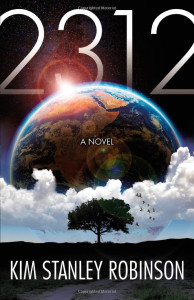 Kim Stanley Robinson fooled me again. The main body of his prose in 2312 is so calm and measured, coolly analytical and matter of fact, that I must have been expecting the Solar System-wide conflict that it portrays to be ironed out peacefully, boringly, in a committee meeting of polite but forthright diplomats. But then, as it nears the 500 page mark, action erupts to avert a crisis, danger flares, lives are lost and almost lost, souls spent spinning across the void of space inside the orbit of Venus, and you can’t seem to turn the pages fast enough.
Kim Stanley Robinson fooled me again. The main body of his prose in 2312 is so calm and measured, coolly analytical and matter of fact, that I must have been expecting the Solar System-wide conflict that it portrays to be ironed out peacefully, boringly, in a committee meeting of polite but forthright diplomats. But then, as it nears the 500 page mark, action erupts to avert a crisis, danger flares, lives are lost and almost lost, souls spent spinning across the void of space inside the orbit of Venus, and you can’t seem to turn the pages fast enough.
Dispensing with any suspense right there in the title, Robinson sets this tale in 2312, exactly 300 years after he wrote it. It takes place within a Solar System transformed, by a human race partially transformed. Those who know Robinson’s books will know that it’s a book of politics, of detailed speculation about what might happen if …
For Robinson is a writer of ideas. In writing 2312 he imagined humanity 300 years in the future, and came up with people living throughout the system. Mars and many of the moons of Jupiter and Saturn have been partially terraformed, Venus is well on its way, and people, sun worshippers, have found an ingenious way to live on Mercury. Hundreds, maybe thousands of asteroids and Kuiper Belt objects have been transformed as well, into mobile “terrariums” that shuttle folks around the system. On Earth, things remain as fractious and divided as they ever were throughout history.
Not only have humans been been transformed by living in a wide variety of habitats throughout the Solar System, and by medical advances that boost longevity well past 100 years, but they’ve been genetically modified as well; one character says he believes that human speciation is well underway. But most pivotal to the plot, and most germane for readers in 2023, 10 years after its first publication, is the issue of artificial intelligence – the many ways in which it assists humanity and the possibility that it may be dangerous as well.
All these ideas do not make a story, though. For that, we need characters and a plot. Our main character is Swan Er Hong, Swan for short. As we meet her in her home on Mercury, she’s preparing for the memorial service for Alex, who was a grandmother to Swan and also one of the key movers and shakers in the Solar System. She discovers that Alex has left her a message with instructions that set Swan off on more than one quest across the system and back. The mission’s purpose is deliberately kept from Swan, and both Swan and the reader slowly find out why.
The answer has to do with the artificial intelligences that humans call qubes, which are used as everything form personal assistants – Swan, unusually, has one named Pauline embedded in her neck that she communicates with directly – to running the machines that keep humanity alive, from agricultural harvesters to manufacturing facilities to habitats to space ships.
Early in Swan’s travels she encounters a resident of Titan named Wahram, with whom she shares some dangers and adventures and forms a prickly relationship. For Swan is a very different and difficult individual, as we slowly learn as the story unfolds. Wahram is an absolutely delightful character, whom Swan sees as looking and behaving quite frog-like. He’s deliberate where she’s impulsive, impassive where she’s flighty, patient where she’s irascible; and he’s enamored of classical music, particularly Beethoven’s symphonies and late concertos.
Robinson, as he frequently does, employs a number of literary devices. The story is told from varying points of view, those of including Swan, Wahram, a diminutive interplanetary detective improbably named Jean Genette, and Kiran, a former denizen of the New Jersey swamplands whom Swan helps relocate to Venus after he saves her bacon on Earth. All of them play their parts in unravelling the central whodunnit – who created an incident on Mercury that nearly kills Swan and Wahram, and why, and what might they do next, and are the qubes involved? Also interspersed throughout are short chapters that consist of lists and snippets of “extracts” and other non-linear interjections that comment on the action in various ways, some of them apparently from the future.
My favorite list purports to be from The Journal of Space Accidents vol. 297, published in 2308. It’s a partial enumeration of ways to die in space, ranging from “accidental critical mass” and “sudden air loss” to “recreational mental impairment,” “dropped tool,” and “tripped and fell.”
If all that makes 2312 sound like a slog, well, it is at times. I had to renew it three times from the library before I finished it. Swan is such an odd character, the action so paced, the political, philosophical, psychological, and technological diversions sometimes so dense, that this book isn’t a page turner. Until it is. It’s also very entertaining, quite funny at times, and chock full of fascinating ideas. Recommended reading for anyone interested in thoughtful worldbuilding, realistic projections of humanity’s possible futures, and complex storytelling.
(Orbit, 2012)
